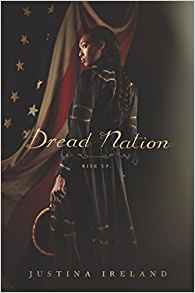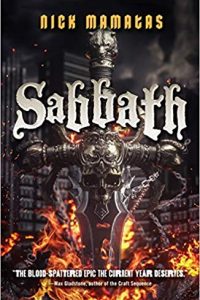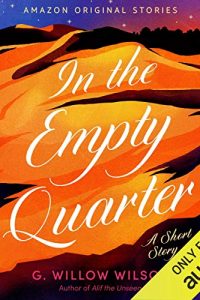Arley Sorg Reviews Dread Nation by Justina Ireland
 Dread Nation, Justina Ireland (Balzer + Bray 978-0-06-257060-4, $17.99, 464pp, tp) April 2018.
Dread Nation, Justina Ireland (Balzer + Bray 978-0-06-257060-4, $17.99, 464pp, tp) April 2018.
Justina Ireland’s Dread Nation may have a zombie premise, but the read is far from standard pulp horror fare. Towards the end of the American Civil War, during the battle of Gettysburg, the dead rise, changing history in remarkable ways. With the abolition of slavery, Congress funds the Native and Negro Reeducation Act. Negroes are often put into combat training camps, becoming the front line of defense against “shamblers” (zombies), whether or not they want to be “reeducated.” It’s a dangerous occupation. Some see it as a way for Negroes to better themselves and others see it as nothing but an extension of slavery. The luckiest of such Negroes become “Attendants”: guards dressed in finery who protect wealthy (white) socialites.
Jane McKeene is a young Negro girl from Kentucky, the child of “the richest white woman in Haller County.” Forced to leave her home and enter what is perhaps the most prestigious training camp, Miss Preston’s School of Combat in Baltimore, she wants nothing more than to finish training and return home to Rose Hill plantation, to protect the mother who let her be taken away.
Jane must contend with classmate Katherine Devereaux, who is “passing white” and gorgeous enough to turn heads. Katherine is an annoying teacher’s pet. Combine this with her being Jane’s equal in combat grades and the fact that she is eager to turn Jane in for any wrongdoings, and she becomes a fascinating rival. Unfortunately, wrongdoing is an area in which Jane excels. Stubborn, hot-headed, and smart, Jane breaks rules in abundance, from sneaking in books to sneaking out of the school at night for unauthorized shambler slaying.
An advantage of the prestige of Miss Preston’s is the likelihood of a good posting as an Attendant. Following this, Jane and Katherine are quickly noticed by Baltimore’s social and political elite. Mayor Carr is a “survivalist” – a political group who laud the safety of Baltimore and want to return the social structure of America to the way things were before the dead rose; i.e., slavery. Jane’s desire to get back home is quickly complicated by the attentions of the mayor, the pressure to shoot for a good posting, shambler sightings closer to Baltimore than they should be, and, more importantly, the disappearances of notable families around Baltimore.
Enter Jackson “Red Jack” Keats, Jane’s former flame, “a true redbone, fair enough that you know at least a few of his people come from Europe, not Africa.” Jackson is a scoundrel, but he supplies Jane with a steady influx of books, as well as sneaking letters Jane writes her mother to the post. When Red Jack tells Jane that his younger sister Lily and the white family that houses her, the Spencers, have vanished without so much as a farewell, the plot shifts and the stakes rise. Jane sets out to find Lily, getting entangled in the conspiracies of Baltimore.
Dread Nation is at once an action-adventure story and an alternate history, seen through the eyes of a young girl during her coming-of-age in a violent, bigoted era. It’s well plotted with compelling characters, interesting situations, and fascinating details. It’s also an approachable, digestible exploration of some of the ugliest beliefs and practices of people in the United States – topics and contexts that remain important in a society which stills struggles with racial and gender equalities.
At the outset of the narrative, the brutality of the era is exemplified in Jane’s retelling of being a newborn with dark skin: the midwife was about to kill her, since a Negro child born to a white woman is a scandal gone too far, but she was saved by her Aunt Auggie. “I guess it should have been obvious to everyone right then that I wasn’t going to have a normal life,” Jane says. The exploration of prejudice goes beyond cruel white people who think Negroes should be slaves. Dread Nation is a thoughtful, often subtle, and carefully layered examination of varying degrees and kinds of prejudices, including internalized prejudice and complicit behaviors.
Throughout the story, Jane discovers her own place in the world; or, more likely, fights for her place in the world. She grows and reflects and interacts with a host of individuals from a variety of backgrounds and with a range of physical appearances. In following her experiences, which are framed by her specific cultural background and punctuated by relevant vocabulary, the narrative provides (for those who live outside of Black social circles) an introduction to important cultural elements that are still prevalent today. At the same time, those who live within Black culture will find familiar depictions, representations, and touchstones that are often missing from fictional narratives which utilize Black characters.
Cultural representation aside, Dread Nation’s characters actually make decisions, take chances, and suffer consequences. These are individuals with goals. They are complex enough to sometimes surprise the reader while staying within the framework of who they are. Meanwhile, the prose provides a smooth read, dipping into the language of the time and place enough to be engaging without distracting. The story is carefully graphic, grasping the heart in moments, but never going too far.
The heart of Dread Nation, however, is the story of a young woman’s struggle to believe in herself in a world that considers her to be not quite human. She’s not a mutant or an alien; she’s a Negro. As the author says in her opening letter, “It’s about loving a place that doesn’t love you back, no matter how much you might be willing to bleed or die for it.” As an experience of a character’s journey, Jane’s story is personal and affecting, without being weighed down over overwrought.
Reviewing history in new light and in new ways helps our understanding of current climates. Dread Nation provides an opportunity for individuals outside of Black culture to engage with Black culture, as well as an opportunity for Black people to see themselves and their cultural diversity represented. These things are important and wonderful, but besides all of this, besides politics and identity and race theory, Dread Nation is a solid, entertaining story. Buy it. Read it. Talk about it with friends. Above all else, enjoy it.
ARLEY SORG, Associate Editor, grew up in England, Hawaii, and Colorado. He studied Asian Religions at Pitzer College. He lives in Oakland, and usually writes in local coffee shops. A 2014 Odyssey Writing Workshop graduate, he is soldering together a novel, has thrown a few short stories into orbit, and hopes to launch more.
 While you are here, please take a moment to support Locus with a one-time or recurring donation. We rely on reader donations to keep the magazine and site going, and would like to keep the site paywall free, but WE NEED YOUR FINANCIAL SUPPORT to continue quality coverage of the science fiction and fantasy field.
While you are here, please take a moment to support Locus with a one-time or recurring donation. We rely on reader donations to keep the magazine and site going, and would like to keep the site paywall free, but WE NEED YOUR FINANCIAL SUPPORT to continue quality coverage of the science fiction and fantasy field.







